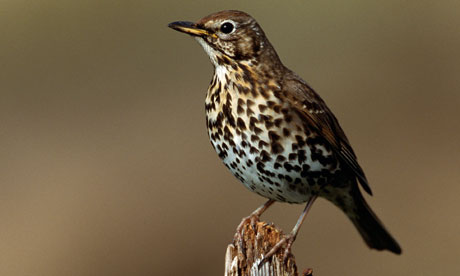How did Bob Marley know what scientists are just now finding out? That bird song helps you to feel better! Wow! Was Bob Marley a musical scientist? Evidently he was... Enjoy!

Scientists to study psychological benefits of birdsong
Three-year research project will explore the impact of birdsong on creativity and sense of wellbeing

A song thrush perched on a post; their song is one of the classic sounds of early spring. Photograph: Alamy
Remove birds from poetry, Aldous Huxley once said, and we would have to cast aside half of the English canon.
Now, the impact of birdsong on our creativity and on our sense of wellbeing is to be explored in a three-year research project at the University of Surrey, supported by the National Trust and Surrey Wildlife Trust.
The study will examine the psychological impact of being exposed to birdsong, including whether it helps us relax, can assist our ability to complete tasks and even think creatively.
Eleanor Ratcliffe, the researcher undertaking the study said while there was a growing body of environmental psychology looking at how the natural world affects people, there was still a lot to understand about the power of specific natural sounds.
Serious birdwatchers may have to sit out the early stages of the research as Ratcliffe will first interview a representative sample of the general public to understand how people perceive natural sounds and whether birdsong does, as bird lovers aver, have a restorative effect.
The raucous screech of a feral parakeet or the aggressive chitter of a magpie may not have quite the soothing effect as a melodious song thrush however, and Ratcliffe hopes to explore the effect of different songs and how individuals relate birdsong to their own memories and sense of place.
Ratcliffe will later recruit subjects through social media and examine the effect of birdsong on their brains and behaviour, as well as testing whether recorded birdsong – played on an iPod for example – could have the same impact as listening to birdsong in cities and in the countryside.
"A great deal of anecdotal evidence suggests that we respond positively to birdsong. However, currently there is a lack of scientific research on the psychological effects of listening to birds," said Ratcliffe. The research project is being funded by the Economic and Social Research Council with further assistance from the National Trust and SurreyWildlife Trust.
Peter Brash, National Trust ecologist, said: "As a lifelong birder I've always had birdsong as a natural soundtrack to my life and believe it's good for the mind and soul. Birdsong gets us closer to nature and links people to places and memories in a way that few other sounds can."
For Ratcliffe, the study will necessitate long hours listening to birdsong on nature reserves in the countryside. "Hopefully I'll be pretty restored by the end of the three years," she said.




No comments:
Post a Comment